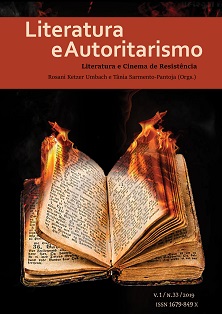Testimony in three voices: testis, superstes e arbiter
DOI:
https://doi.org/10.5902/1679849X35461Keywords:
Testimony, Testis, Superstes, ArbiterAbstract
In the tradition of the studies on testimony we find two well-defined forms of narrators, characterized by Émile Benveniste's (1969) studies, and widely used by research on authoritarianism and Shoah, which see in Brazil the contributions of Márcio Seligmann-Silva (2008) in setting the concepts of testimony testis and testimony superstes. In the wake of these studies, I propose a new category of testimony to the arbiter, which is configured in the narration performed through the recovery of the testimony heard. For a long time, this type of testimony had been devalued because it did not represent the traditional formulations of testis (third) testimony, that one saw and witnessed the painful scene, or the superstes witness (first), the one who lived and witnesses his own experience. We understand that the arbiter (second) testimony of the one who heard and arbitrate what and how to narrate must be validated as part of a testimonial triad, since it is involved in other forms of testimony, for we identify it in narrators, testis and superstes, when describing experiences of others told to him. This category of testimony also appears in what we call the second-generation narrative of the children of survivors, who in most cases narrate through the testimonial reconstruction of the experiences of others, or the testimonies of others, even in relation to their own experience.Downloads
References
AMBRÓSIO, Graziella. Psicologia do testemunho. In. Rev. Direito Econ. Socioambiental, Curitiba, v. 1, n. 2, p. 395-407, jul./dez. 2010.
ARISTÓTELES. Ética a Nicômaco; Poética. seleção de textos de José Américo Motta Pessanha. 4. ed., Col. Os pensadores; v. 2. São Paulo: Nova Cultural, 1991.
BENVENISTE, Émile. Vocabulaire dês intitutions indo-européenes: 2. Pouvoir, droit, religion. Paris: Les Editions de Minuit: 1969.
DIGESTO, Corpus Iuris Civilis - livro I / Equipe responsável: Coordenação e Tradução: Edilson Alkmim Cunha; Ant6nio Augusto Catão Alves. [et al.]. -- Brasília: TRF1, ESMAF, 2010.
FARIA, Ernesto. Dicionário escolar latino-português. Brasil: Ministério da Educação e Cultura/ Departamento Nacional de Educação, 1962. Disponível em:https://archive.org/stream/DicionarioEscolarLatinoPortuguesDoMecPorErnestoFaria1962/DicionarioLatinoPortugus#page/n0/mode/2up
LAPLANCHE, J; PONTALIS, J. B. Vocabulário da Psicanálise. São Paulo: Martins Fontes, 1996.
LEVI, Primo. A trégua. Tradução: Marco Lucchesi. São Paulo: Companhia das Letras, 2010.
MARTINS, Ana Paula Vosne. A medicina da mulher: visões do corpo feminino na constituição da Obstetrícia e da ginecologia do século XIX. Tese de doutorado. Campinas: Unicamp, 2000.
PLATÃO. A República. Tradução: Enrico Corvisieri. São Paulo: Nova Cultural, 1997.
RODOVALHO, Joselina Rodrigues. Perlaboração (durcharbeitung) um modo de resiliência (resilience) psíquica? Brasília, 2006. Disponível em: http://www.kennedy.edu.ar/DocsEsc81/Material%20Bibliogr%C3%A1fico/Perlabora%C3%A7%C3%A3o%20(durcharbeitung)%20um%20modo%20de%20resili%C3%AAncia%20(resilience)%20ps%C3%ADquica.pdf.
SELIGMANN-SILVA, Márcio. Zeugnis e Testemonio: um caso de intraduzibilidade entre conceitos. Revista Letras. Nº 22. Jun/Jan 2001. Disponível em: http://w3.ufsm.br/revistaletras/artigos_r22/ 11_marcio_silva.pdf. Acesso em: 20/08/2009.
SELIGMANN-SILVA, Márcio. Narrar o trauma: a questão dos testemunhos de catástrofes históricas. Revista Psic. Clin. Rio de Janeiro, Vol. 20, Nº 01, p. 65-82, 2008
VILELA, Eugênia. Do testemunho. Princípios: revista de Filosofia, v. 19, n. 31, Natal: Janeiro/Junho 2012, p. 141-179.
Downloads
Published
How to Cite
Issue
Section
License
DECLARAÇÃO DE ORIGINALIDADE E EXCLUSIVIDADE E CESSÃO DE DIREITOS AUTORAIS
Declaro que o presente artigo é original e não foi submetido à publicação em qualquer outro periódico nacional ou internacional, quer seja em parte ou na íntegra. Declaro, ainda, que após publicado pela Literatura e Autoritarismo, ele jamais será submetido a outro periódico. Também tenho ciência que a submissão dos originais à Literatura e Autoritarismo implica transferência dos direitos autorais da publicação digital. A não observância desse compromisso submeterá o infrator a sanções e penas previstas na Lei de Proteção de Direitos Autorais (nº 9610, de 19/02/98).






